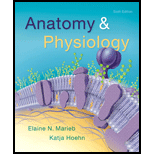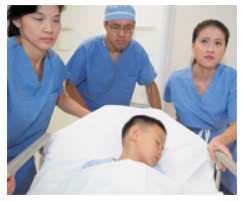
Concept explainers
10-Year-Old Boy with Spinal Injury
On arrival at Holyoke Hospital, Jimmy Chin, a 10–year-old boy, is immobilized on a rigid stretcher so that he is unable to move his head or trunk. The paramedics report that he was awake and alert after his accident at the skateboard park, but crying and complaining that he couldn't get up and that he had a “wicked headache." He has severe bruises on his upper back and head, and lacerations of his back and scalp. His blood pressure is low, body temperature is below normal, lower limbs are paralyzed, and he is insensitive to painful stimuli below the nipples. Although still alert on arrival, Jimmy soon begins to drift in and out of unconsciousness.

Jimmy is immediately scheduled for a CT scan, and an operating room is reserved.
Relative to Jimmy's condition:
Two days after his surgery, Jimmy is alert and his MRI scan shows no residual brain injury, but does show pronounced swelling and damage to the spinal cord at T4. On physical examination, Jimmy shows no reflex activity below the level of the spinal cord injury. His blood pressure is still low.
6. Over the next few days, his reflexes return in his lower limbs and become exaggerated. He is incontinent. Why is Jimmy hyperreflexive and incontinent?
On one occasion, Jimmy complains of a massive headache and his blood pressure is far above normal. On examination, he is sweating intensely above the nipples but has cold, clammy skin below the nipples and his heart rate is very slow.
Want to see the full answer?
Check out a sample textbook solution
Chapter 14 Solutions
Anatomy & Physiology (6th Edition)
- Artificial Selection: Explain how artificial selection is like natural selection and whether the experimental procedure shown in the video could be used to alter other traits. Why are quail eggs useful for this experiment on selection?arrow_forwardDon't give AI generated solution otherwise I will give you downwardarrow_forwardHello, Can tou please help me to develope the next topic (in a esquematic format) please?: Function and Benefits of Compound Microscopes Thank you in advance!arrow_forward
- Identify the AMA CPT assistant that you have chosen. Explain your interpretation of the AMA CPT assistant. Explain how this AMA CPT assistant will help you in the future.arrow_forwardwhat is the difference between drug education programs and drug prevention programsarrow_forwardWhat is the formula of Evolution? Define each item.arrow_forward
- Define the following concepts from Genetic Algorithms: Mutation of an organism and mutation probabilityarrow_forwardFitness 6. The primary theory to explain the evolution of cooperation among relatives is Kin Selection. The graph below shows how Kin Selection theory can be used to explain cooperative displays in male wild turkeys. B When paired, subordinant males increase the reproductive success of their solo, dominant brothers. 0.9 C 0 Dominant Solo EVOLUTION Se, Box 13.2 © 2023 Oxford University Press rB rB-C Direct Indirect Fitness fitness fitness gain Subordinate 19 Fitness After A. H. Krakauer. 2005. Nature 434: 69-72 r = 0.42 Subordinant Dominant a) Use Hamilton's Rule to show how Kin Selection can support the evolution of cooperation in this system. Show the math. (4 b) Assume that the average relatedness among male turkeys in displaying pairs was instead r = 0.10. Could kin selection still explain the cooperative display behavior (show math)? In this case, what alternative explanation could you give for the behavior? (4 pts) 7. In vampire bats (pictured below), group members that have fed…arrow_forwardExamine the following mechanism and classify the role of each labeled species in the table below. Check all the boxes that applyarrow_forward
- 1. Define and explain the two primary evolutionary consequences of interspecific competitionarrow_forward2 A linear fragment of DNA containing the Insulin receptor gene is shown below, where boxes represent exons and lines represent introns. Assume transcription initiates at the leftmost EcoRI site. Sizes in kb are indicated below each segment. Vertical arrows indicate restriction enzyme recognition sites for Xbal and EcoRI in the Insulin receptor gene. Horizontal arrows indicate positions of forward and reverse PCR primers. The Horizontal line indicates sequences in probe A. Probe A EcoRI Xbal t + XbaI + 0.5kb | 0.5 kb | 0.5 kb | 0.5kb | 0.5 kb | 0.5 kb | 1.0 kb EcoRI On the gel below, indicate the patterns of bands expected for each DNA sample Lane 1: EcoRI digest of the insulin receptor gene Lane 2: EcoRI + Xbal digest of the insulin receptor gene Lane 3: Southern blot of the EcoRI + Xbal digest insulin receptor gene probed with probe A Lane 4: PCR of the insulin receptor cDNA using the primers indicated Markers 6 5 4 1 0.5 1 2 3 4arrow_forward4. (10 points) woman. If both disease traits are X-linked recessive what is the probability A man hemizygous for both hemophilia A and color blindness mates with a normal hemophilia A nor colorblindness if the two disease genes show complete that a mating between their children will produce a grandson with neither a. linkage? (5 points) that a mating between their children will produce a grandson with both hemophilia A and colorblindness if the two disease genes map 40 cM apart? (5 points)arrow_forward
- Surgical Tech For Surgical Tech Pos CareHealth & NutritionISBN:9781337648868Author:AssociationPublisher:Cengage
 Anatomy & PhysiologyBiologyISBN:9781938168130Author:Kelly A. Young, James A. Wise, Peter DeSaix, Dean H. Kruse, Brandon Poe, Eddie Johnson, Jody E. Johnson, Oksana Korol, J. Gordon Betts, Mark WomblePublisher:OpenStax College
Anatomy & PhysiologyBiologyISBN:9781938168130Author:Kelly A. Young, James A. Wise, Peter DeSaix, Dean H. Kruse, Brandon Poe, Eddie Johnson, Jody E. Johnson, Oksana Korol, J. Gordon Betts, Mark WomblePublisher:OpenStax College - Understanding Health Insurance: A Guide to Billin...Health & NutritionISBN:9781337679480Author:GREENPublisher:Cengage
 Human Biology (MindTap Course List)BiologyISBN:9781305112100Author:Cecie Starr, Beverly McMillanPublisher:Cengage Learning
Human Biology (MindTap Course List)BiologyISBN:9781305112100Author:Cecie Starr, Beverly McMillanPublisher:Cengage Learning





